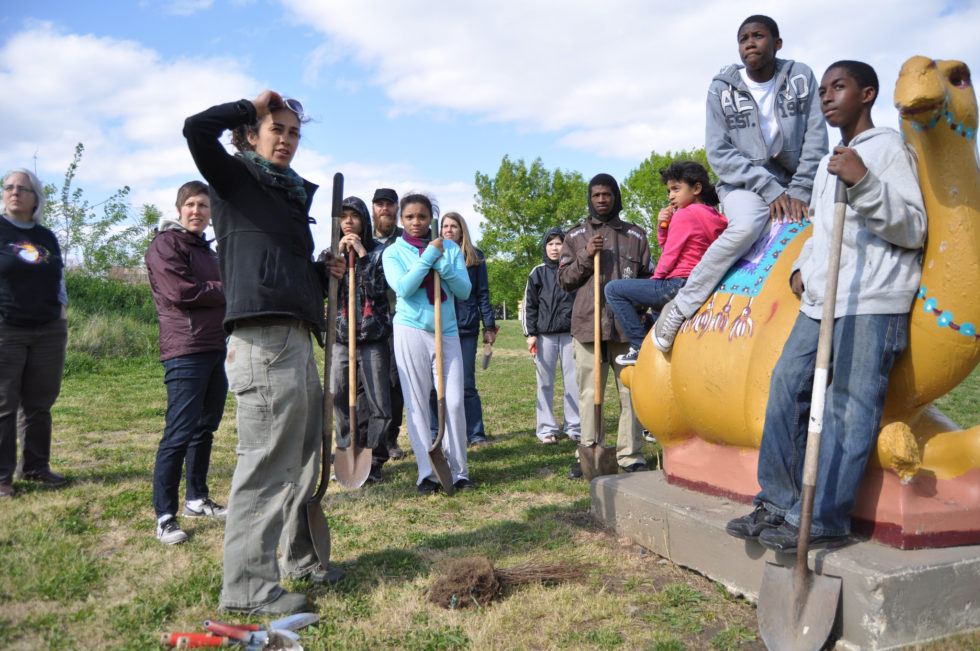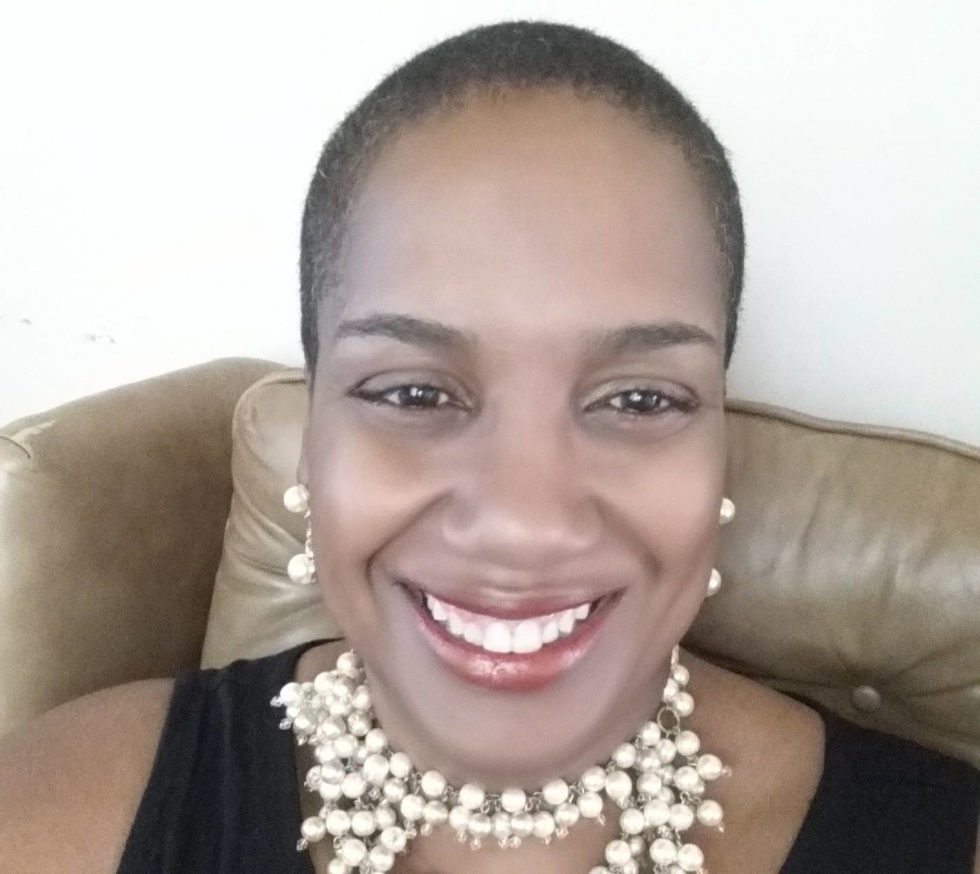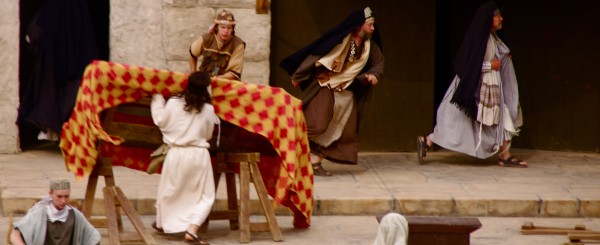
This post was originally published two years ago as MMMMs: Expanding our Churchly imagination in my blog for The Mennonite. Thanks to Hannah Heinzekehr for adding photos to illustrate this piece.
In the wake of this summer’s Mennonite Church USA convention and the pending departure of Lancaster Conference, I am reflecting on the role of “Moderate Mennonite Male Managers” (MMMM’s) in our institutions. This recent essay by John Rempel inspired me to look specifically at a blind spot common among the the “Moderate Mennonite Male Managers” (MMMM’s) of our institutions. For those of you who haven’t read it, this quote summarizes Rempel’s thesis well:
Each type of church brings different gifts to the table. Moderates bring the willingness and capacity for meaningful compromise. Liberals bring the capacity to live with ambiguity and with matters that are presently incapable of solution. Conservatives bring a deep trust in the Bible and the Holy Spirit as sources of clear positions in matters of faith and life.
I resonate with Rempel’s 1 Corinthians 12 inspired vision of the different gifts of the body of Christ that he outlines. However, Rempel’s paradigm, focused around liberals, moderates and conservatives, misses a whole swath of our community and Anabaptist tradition.
To understand more about this missing community, I turn to the model of four streams of Anabaptism that Rodney Sawatsky outlined in 1992. In summary, he traces four contemporary streams of Anabaptism back to our 15th century origins: Separationist, Establishment, Reformist and Transformationist. I will focus in this article on the transformationist, but you can see Sawatsky’s table with all four in my 2007 blog post. These streams do not map perfectly onto Rempel’s model of liberals, moderates and conservatives, but however you slice the cantaloupe, the transformationist stream is glaringly absent.
(more…)
TimN
October 27, 2017
Four Streams of Anabaptism Series, Group Identity, Institutions, Mennonite Church USA, Power, Privilege, Race, Sexismbureaucracy
Read more >

This interview, originally published two years ago, was the eighth interview in my ongoing Anabaptist Camp Follower series in which I interview people who have been drawn to Anabaptism and Mennonites. Kelly Bates Oglesby is pastor at Park View Mennonite Church in Kokomo, Ind. Our interview happened before the massacre of nine Black Christians in Charleston on June 17. That act makes her words all the more important.
Can you share about your journey with Mennonite Church USA and becoming pastor at Parkview Mennonite Church?
As a requirement of my seminary study I needed to complete an internship in a faith community that was dissimilar from my own. As I perused the available openings I was drawn to one at First Mennonite Church in Indianapolis. The Mennonite setting was certainly dissimilar from my Free Will Baptist tradition even though both are Anabaptist in grounding.
Until I came to seminary and met Dr. Wilma Bailey, I had no personal interactions with Black Mennonites. My discussions with her and observations of her had piqued my interest. I submitted my application to First Mennonite Church and completed the process to become an intern. Unlike some learning sites, FMC wanted me to learn about the congregation and conference. Moreover, they allowed me to experience and experiment with ministry development.
During my initial year, I met weekly with the lead pastor to discuss theology and polity. Regular small group interactions helped me to learn to know the congregation. As part of my student work I initiated a project each semester to broaden the ecumenical witness of the congregation.
At the end of my first year, I was invited to complete my second internship year with the congregation. This was thrilling and concerning: I realized I was beginning to feel at home.
(more…)
TimN
July 24, 2017
Anabaptist Camp Followers, Mennonite Church USA, Privilege, Race
Read more >
“The Spirit of the Lord is upon me, because he has anointed me to bring good news to the poor. He has sent me to proclaim release to the captives and recovery of sight to the blind, to let the oppressed go free, to proclaim the year of the Lord’s favor.” Luke 4:18-19
“…the hands of none of us are clean if we bend not our energies to righting these great wrongs.” W.E.B. DuBois
I traveled to Ferguson, MO from August 21-24 along with two other community organizers from New Orleans, LA. We visited the Canfield Green apartments where 18 year old Michael Brown was shot and killed by a police officer and where beautiful memorials had been created. One sign referenced the story of Cain and Abel in Genesis 4: 8-10 — “And the Lord says: ‘What have you done? The voice of your brother’s blood cries out.” And indeed, roses lined the street where traces of Michael’s blood were still evident, crying out for those with ears to hear.
We talked with Ferguson residents, including a group camped out in a parking lot across from the police station and some youth camped in the “approved assembly area” in the parking lot of an old car dealership. Both of these groups said they planned to stay until Darren Wilson, the police officer who killed Michael Brown was indicted, and we brought them water and ice and fruit as a way of expressing our support and appreciation for their persistent call for justice.
That evening, we saw how W. Florissant Avenue was closed to all thru traffic beginning at its intersection with Chambers Road, a full mile away from the “approved assembly area.” Anyone who wanted to join the protest had to walk a mile just to get to the protest site and then march in a spot cut off from the rest of the public, where police imposed a “5 second rule” which required protesters to keep moving, breaking up any conversations among groups of protesters who began to gather together.
This was only the most recent attempt to contain and squash people’s cries for justice. Others who had been in Ferguson earlier reported even more intense police repression. Police shot tear gas and rubber bullets at unarmed people who were in places they had every right to be including their own backyards, driveways and doorways. Purvi Shah of the Center for Constitutional Rights was part of a multigenerational crowd –including a number of children– into which police fired tear gas, with no warning and a full three hours before the midnight curfew that had recently been established. Many first person stories of encounters with police oppression are available if you look for them. What we saw in Ferguson was a community under occupation by police. No one felt safer. The constant threat of violence by police toward protestors was palpable.
(more…)
PamN
August 30, 2014
antiracism, Current Events, empire, Nonviolence, Peace & Peacemaking, Police, Police Brutality, Power, Race, Social justice, Social movements, Violence, Young Folksantiracism, empire, Nonviolence, Peace & Peacemaking, Police Brutality, Power, Race, Social movements, Violence
Read more >
Today a friend shared his experience when he was a young white teenager hanging out with young Latino men. When there was a possibility of encountering the police, they would say, “act white” and my friend would be asked to do the talking. What does “acting white” look like? If you’re asking that question, you’re probably white. For people of color in the United States there is often a “constant background processing” to empathize with white people around them and deal with their stereotypes. Strategies may range from dressing impeccably to whistling Vivaldi.
This week I’m preparing for a panel with Mennonerds on Race, Mutuality and Anabaptist Community. This blog post is a brief look at some of the themes I’m hoping we can discuss as practices for white people developing lenses to see differently through listening with humility.
Let’s start with changing lenses as Jesus talked about in this classic Sunday school passage, Matthew 18:1-5:
At that time the disciples came to Jesus and asked, “Who, then, is the greatest in the kingdom of heaven?” He called a little child to him, and placed the child among them. And he said: “Truly I tell you, unless you change and become like little children, you will never enter the kingdom of heaven. Therefore, whoever takes the lowly position of this child is the greatest in the kingdom of heaven. And whoever welcomes one such child in my name welcomes me.” (NIV)
Immediately in my mind’s eye I see this image or one of a thousand like it:

(more…)
TimN
June 11, 2014
Power, Privilege, Race
Read more >
MENNONITE CHURCH USA CHURCHWIDE STATEMENT ON LGBTQ COMMUNITIES, DIVERSITY, POWER, OPPRESSION &Â PRIVILEGE*
Introduction
Mennonite Church USA has roots in seventeenth-century churches planted by what today we might call “radicals” and “social justice activists” from Europe. Our church continues to grow and be enlivened by people who join us from many countries, backgrounds, races, genders, sexual orientations, abilities, as well as other diversities and differences. As Christians, we believe we are called to welcome these seekers of church community in our congregations and communities, especially as our government fails to serve all but a privileged few, with harsh laws frequently punishing difference. Assumptions about identity make some people more vulnerable to political biases and discrimination than others. Our concerns about the status of peace and justice in this country and in this world relate to how people are treated based on race, nationality, ethnicity, gender, sexual orientation, class, ability status, citizen status, religious identity as well as other statuses.
We reject our country’s mistreatment of people, repent of our silence, and commit ourselves to act with and on behalf of all our community members regardless of any status. (more…)
JenniferY
February 17, 2014
activism, antiracism, Current Events, disabilities, Ethics, Exclusion, Faith, Gender, Group Identity, Immigration, Indigenous, Leadership, LGBTQ, Love, Mennonite Church USA, Nonviolence, Peace & Peacemaking, Power, Privilege, Race, Sex, Tactics, Violencebisexual, gay, Inclusion, lesbian, LGBTQ, MC USA, MC USA Executive Board, Mennonite, queer, Statement, transgender
Read more >
You may have seen news lately about different countries considering new harsher penalties for sodomy or whatever language they might choose. It’s happening in Russia, Uganda, Nigeria and Kenya and I’m sure many other places.
These days in the US many queer folk are tracking the lawsuits in each state that are striking down the same-sex marriage bans. It’s exciting for sure and I look forward to June of this year when all consenting adults will finally be able to marry here in Illinois.
In the midst of all this though I see news stories of a strong trend in the opposite direction in many other parts of the world. When I see a young man accused of homosexuality being tried and beaten to death in the streets by a vigilante mob I’m shocked! I never worry about this happening to me when I step outside my home in Chicago. While there are parts of this country I worry that I might be physically harmed for being gay I never expect to be put to death due to my sexuality.
The disturbing thing about these laws is that the consequence imposed by the government for breaking these laws is meaningless. The reality is that that people accused of homosexuality may never make it to court and if they do they may even be killed in the courtroom. This is how intense the homophobia is in some countries.
When I read the article about what happened in Nigeria my mind went certain places and I suspect that many people’s minds and hearts do the same. I think about how terrible these people are. I wonder how they can do these awful things. How does someone cultivate this kind of hatred and violence in their heart? Finally I become indignant! (more…)
benjaminjanderson
January 27, 2014
Bias, Death, Exclusion, Family, Hate, LGBTQ, Martyrdom, Peace & Peacemaking, Polarization, Power, Privilege, Race, Social justice, Violence
Read more >
When I began looking for an Anabaptist congregation, I was immediately drawn to the San Antonio Mennonite Church here in the Alamo City. Truth be told, I probably would have stayed within our house-church if it weren’t for the fact that many of our families were moving. But as necessity compelled me to search for a tribe, the Anabaptist emphasis on Jesus discipleship, servant minded non-violence, and its history of persecution welcomed me. I’m glad we found a home in the MCUSA.
Having grown up as the son of an ordained minister in the Southern Baptist Convention, I was frightfully aware of the denominational politics our family encountered having served under two SBC Presidents. But Anabaptism offered more than that, with less, or so it seemed.
Theda Good’s recent ordination seems to have served as a sort of catalyst in the ever growing divide between the young and old, urban and rural MCUSA membership. But from my location, these reactionary reverberations seem to find their epicenter on the conservative side of the aisle while the almost certainly inevitable LGBTQ ordination seems to originate on the progressive side. Regrettably, I feign to even use the binary language associated with progressive versus conservative politics, but it seems that such language indicates that we have already bought in to the us vs. them mentality that dominates our American culture.
What about the Third Way?
I’m perplexed as to why we’re having this conversation in the first place. Looking at arguments from “both sides,” I keep asking myself, “where is Jesus in this?” I see Jesus in the calls for humility and servanthood. I see Jesus in the cautionary language encouraging dialogue instead of schism. But I don’t see Jesus in the Soddom and Gommorah rhetoric, and neither do I see it in the practice of ordination.
(more…)
TylerT
January 3, 2014
activism, Anabaptism, Bigotry, Church, Class, culture, Current Events, empire, Exclusion, Faith, Gender, Leadership, LGBTQ, Mennonite Church USA, neo-Anabaptism, Privilege, Race, Schism, Sexism, Social justice, The Bible, Tolerance, Tradition
Read more >
Earlier this month, Charity Erickson wrote an article, “Peace Reformation = Humble Leaders” that offered some questions and challenges for neo-Anabaptists around leadership and the roots of this growing movement. The response, in the comments on her post and on social media, was cantankerous. I followed up with her to do an interview, the fifth in my Anabaptist camp followers series. My questions are in bold. Crossposted from As of Yet Untitled
 What does neo-Anabaptism mean to you?
What does neo-Anabaptism mean to you?
Charity: I understand neo-Anabaptism to be an ecumenical movement that is inspired and influenced by Anabaptist thought. This influence isn’t confined to traditional Anabaptist thought as expressed in documents like the Schleitheim Confession; it includes the critique of power that we get from post-modernism and post-colonialism. These critiques are not native to Anabaptist thought. In many ways, they are not native to Western thought. But they are good critiques; they are Spirit-guided, I think.
How did you first come across neo-Anabaptist thought and practice?
Charity: When I was 11–around 1996–I joined the Bible Quiz team at my Christian Missionary Alliance church. We memorized a lot of scripture; but we also had these t-shirts that we inherited from a group that had recently split off from our church to focus on their urban ministry in Minneapolis, which included communal living, serving those struggling with poverty, and fostering interfaith dialogue. The t-shirts were black with an anarchic kind-of symbol on the front, and the words, “Resistance is Futile.”
(more…)
TimN
October 26, 2013
Anabaptist Camp Followers, empire, neo-Anabaptism, Power, Privilege, Race, Sexism
Read more >
(This post was originally posted at http://drewgihart.com/2013/08/28/unkingdombookreview/)
Mark Van Steenwyk has written a thoughtful reflection on the significance of Jesus and his in-breaking Kingdom as an alternative way of being in our society that is marred by evil forces, social structures, death-dealing oppression, and coercive violence. the UNkingdom of God is a subversive and anti-imperial vision for a repentant life concretely following after Jesus, that doesn’t attempt domestication or try to mince words. The book reflects the radicalism of an Anabaptist vision, as well as a liberative and prophetic witness that takes seriously the abandoning of empire while walking humbly in the footsteps and Way of Jesus.
One of the most important things about the UNkingdom of God is the way that he exposes how America and Christianity have merged so profoundly, being so deeply intertwined, that it has merely become an imperial puppet and tool. This is primarily done through personal stories as he retells his own story of being indoctrinated with American Christianity, awaking from it, and then ultimately repenting from it. It is primarily his own lived experience being told, often humorously, that I believe will resonate with many that consider themselves Christian while also a part of the dominant culture. For example he begins in the introduction explaining his infatuation with America and its ‘Dream’, and how he responded when he heard the song “God Bless the USA” as he watched fireworks in the sky. He explains:
At this point, I could no longer sing along. With tears in my eyes and a sob in my throat, I broke down weeping. I was overwhelmed with a sense of gratitude and pride. I wept as the song played out, and I continued to weep as the fireworks began to fill the night sky. It was like a mystical experience.[1]
Clearly, Mark Van Steenwyk understands what it is like to be enthralled with America and American Christianity. However, he didn’t remain there. The goal of the book is to call people to repentance. And this is the particular strength of this book. I am not sure I have read a book that has so clearly and powerfully called people to repentance in a way that resonates with the way that Jesus did so. We are challenged to repent of our Christianity and how we have been unwilling to experience God because we have him figured out already. He names the issue. It is that “We think we are open to learning the way of Jesus, but our cup is already full of our own ideas.”[2] It is something that we are not conscious of, therefore, we go on engaging scripture and sermons as though we are growing in Christ, when in reality our cups are already full, so everything else just spills out. Steenwyk reminds us that “We need to empty our cups. We need to repent of the myths that crowd our imaginations. We need to repent of our Christianity.”[3] Ultimately, Steenwyk describes that we need to even release and let go of our image and understanding of Jesus before we can truly “be the love of Christ in our world.”[4]
(more…)
DrewH
August 28, 2013
activism, Anabaptism, Community, empire, Ethics, Faith, liberation theology, patriotism, Race, TheologyAnabaptism, anablacktivist, anarchism, Christianity, Jesus
Read more >
By Pam Nath. Cross-posted from The Mennonite 
Image by Ricardo Levins Morales
If “your” elected officials are middle-aged, white people who smile at you a lot, it may be time to relocate. Being a “minority” – even a sizable minority – in a city with white officials has become more of a hazard than at any time in the last twenty years. American justice is divvied out across a great racial divide. We don’t believe that Black elected officials are – on their own – a cure for our problems. However, we do have a greater ability to pressure them. [Living in a white community], you may have more government services, but those services include more policing by officers who think your child is dangerous. If you move, the idea that your child is not as easily singled out can give some comfort.
—Kamau Franklin, New Rules for the Black Community after the Zimmerman Verdict
“We know that the whole creation has been groaning in labor pains until now, and not only the creation, but we ourselves, who have the first fruits of the Spirit groan inwardly…Likewise the Spirit helps us in our weakness; for we do not know how to pray as we ought, but that very Spirit intercedes with sighs too deep for words.” Romans 8: 22—23a, 26
Because I know that Kamau Franklin’s words in the quote above are likely to be disturbing to many people who read this column, and some may be tempted to dismiss them as the words of a hateful demagogue, I want to begin by saying that I have met Kamau on several occasions, and once participated in a two-day strategic planning meeting with him. He has never been anything but kind and friendly to me, a white woman, and in fact, has always struck me as a particularly gentle and thoughtful person. If his words seem jarring and painful to you, my plea to you is to struggle to hear them nonetheless. I think doing so is critically important to the life of our church because I am sure there are other Mennonites who are reading this column who totally get where Kamau is coming from, and in fact are feeling and wondering similar things as he. We are a divided church and sadly, the dividing walls between us (Ephesians 2:14), rather than being broken down by a free movement of the Spirit, too often are growing ever thicker.
(more…)
PamN
July 21, 2013
antiracism, Church, Privilege, Race
Read more >

Oh how I wish Jesus had set a better example!
Let’s be reasonable here. He should have proposed his prophetic action in consultation with the religious leadership far in advance of the Passover feasts. This would have reduced so much stress for the Pharisees and scribes.
He shouldn’t have made his case using sacred scriptures. Too risky, too radical, too much playing his religion card like he knew it all. Why did he have to bring Isaiah or Jeremiah into this, crazy activists claiming God’s house for foreigners, eunuchs and the like! One issue at a time now! How dare he come to the temple with an agenda!
He certainly should have worked within the structures to ensure no one would be offended, no one would risk the chance at dialogue due to untimely, unvetted mention of certain outcasts. Didn’t he know that if you want to include these people, you have to exclude those people.
He should have toned it down at least a little, no name-calling nor blocking pedestrian traffic in the temple. And what’s with the whip of cords!?
Read more and get involved over at overturningtables.org!
CharlettaE
July 1, 2013
activism, Allyhood, Anabaptism, antiracism, Current Events, Exclusion, Gender, Group Identity, Immigration, Indigenous, LGBTQ, Mennonite Church USA, Peace & Peacemaking, Polarization, Power, Privilege, Race, Social justice, Spiritual Life
Read more >
Hey y’all,
Jonathan Wilson-Hartgrove just wrote an article today, called “Nonviolence for White People” and invites your feedback: http://www.mennoworld.org/blog/2013/1/10/nonviolence-white-people/
This is a great discussion for young Anabaptist radicals, particularly white folks.
ST
January 10, 2013
activism, Allyhood, New Monasticism, Nonviolence, Power, Privilege, Race
Read more >
Several months ago I drafted a post on Occupy Wall Street suggesting that people interested in thinking through issues of race and gender (re)turn to Adrienne Rich as a wise source. We so often forget those who have gone before us, outside a fairly limited range, and I thought posting a few quotations from one of Rich’s essays might provoke thought and also encourage folks to dig out college anthologies, hunt down books in the library, or do a little web-searching.
I didn’t post the little piece because I wanted it to be Just Right. Then I got busy.
And now Adrienne Rich has died, and I am reminded again of how much she has to teach us.
(more…)
CindyW
March 30, 2012
activism, antiracism, Books, Current Events, Economics, Gender, Group Identity, Media, Poetry, Politics, Privilege, Race, Sexism, Stories, Wealth, Writing
Read more >
 This is the sequel to Our most bitter opponents: the Christians who fought against Dr. King and also to Oppression is Bad, Now What?. Thanks to Sharon William’s comment on The Mennonite for my title.
This is the sequel to Our most bitter opponents: the Christians who fought against Dr. King and also to Oppression is Bad, Now What?. Thanks to Sharon William’s comment on The Mennonite for my title.
As we think about what it means to be an ally and look at the continuing legacy of white supremacist Christianity, the Beattitudes in Matthew and Luke have a lot to offer us.
Too often, when we read differing version of Jesus’ words in different gospels, we try to ignore them. But I think these two passages speak deeply to beautiful, complimentary truths about the movement that Jesus invites us into.
In short, the beatitudes in Matthew focus on spiritual and emotional virtues: poor in spirit, mourning, meekness, thirsting for righteousness, mercy, pureness of heart, peacemaking and the being persecuted for righteousness.
As I grew up learning these, I thought of these as things I do on my own. It was up to me, as an individual, with God’s help to be merciful, pure in heart and meek. It might be hard, but it was fundamentally a personal struggle that God and I worked on.
It’s easy for us to look at the beatitudes and say, as the Bishop of London did, “This is just a spiritual thing. Jesus wasn’t concerned with people’s economic or political well being. All he cared about was their spiritual virtues.”
(more…)
TimN
January 31, 2012
Allyhood, Church, liberation theology, Race, The Bible
Read more >
Warning: This blog post contains some graphic images.
MLK day is day when we appropiately focus a lot on the Reverend Dr. Martin Luther King Jr.’s Christianity and the prophetic witness of the movement he led against racism and white supremacy.
We sometimes forget that most of the white people who Dr. King challenged were Christians. I think it is as important for me as a white person to understand the faith of the segregationists as it is to understand Dr. King’s faith. This is one way I can do my work and understand whiteness in the work of anti-racism.
Let’s start by taking one step back and looking at slaveholder Christianity. Specifically, the faith of white Christians who owned African-American slaves here in the United States. (more…)
TimN
January 15, 2012
Church, Privilege, Race, Theology
Read more >



 What does neo-Anabaptism mean to you?
What does neo-Anabaptism mean to you?

